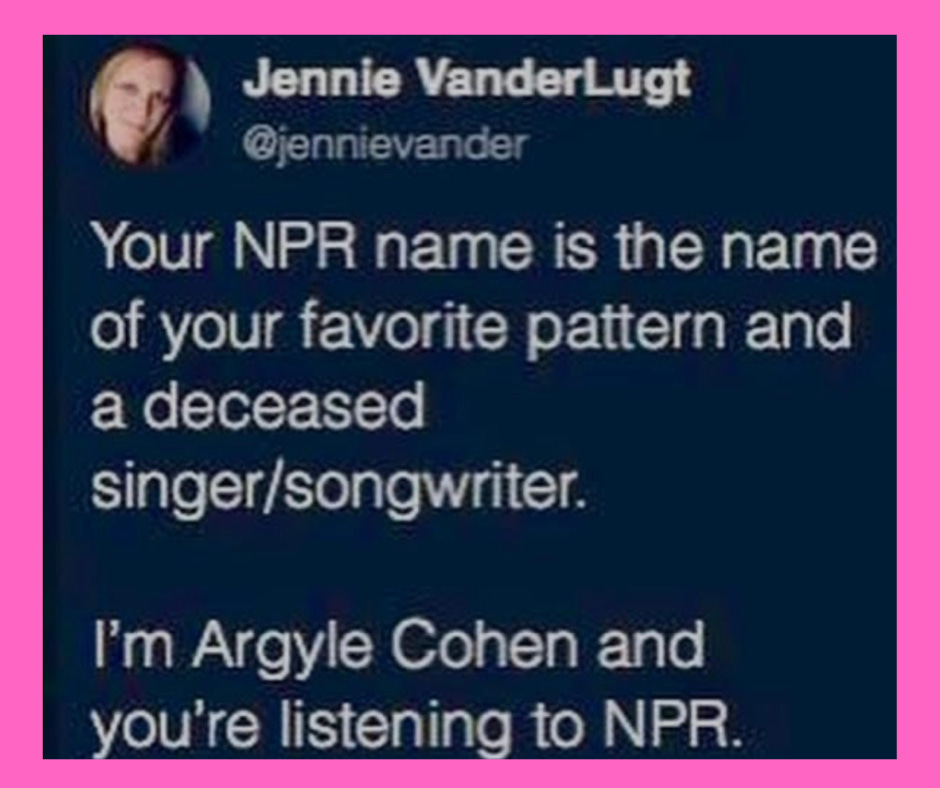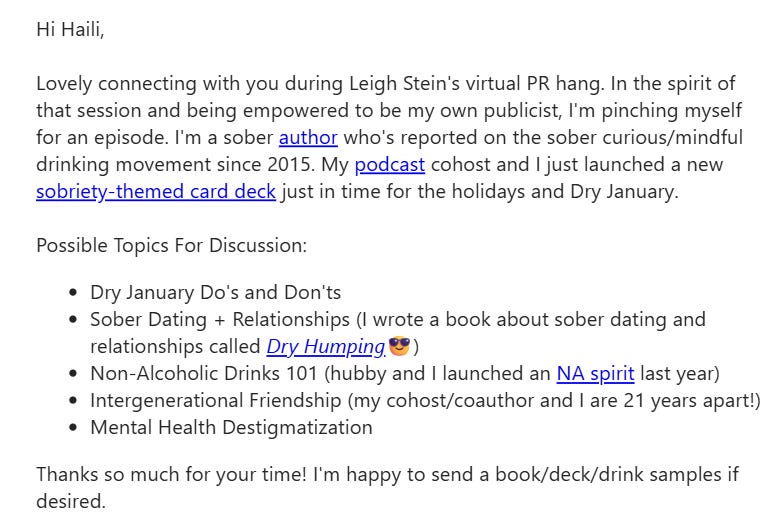Everyone wants to know what sells books, moves copies, builds ~BUZZ~. Is it TikTok, is it Fresh Air, is it word of mouth?
Conventional wisdom nowadays is that an interview on NPR can help your book but not like it used to. I don’t think anyone’s arguing there’s no clout that comes with it though (I mean, come on, we’re like the indie bookstores of media!!).
What we do know is that landing an interview on NPR won’t hurt you. Unless you say something fucking insane. But actually that might still help you.1
I can’t tell you how to get your book covered on EVERY show, but I can tell you how to get your book on (counts fingers) three shows: 1A, All Things Considered and KUOW’s Soundside2, which together reach over 17 million people a week. (Let the record show that I did reach out to freakin’ Fresh Air but didn’t hear back. It’s FINE, TERRY <3).
I hit up two public radio divas to spill what they look for in a book pitch: Kath is a producer for All Things Considered and Gabi is a senior producer at KUOW’s Soundside. Gabi was formerly at Here & Now. Both are former 1A-holes <3.
Here’s what they dished:
1. What are the biggest mistakes you see when people pitch you books?
At NPR, individual shows call "dibs" on particular books we're interested in covering so that we don't have repeat interviews across the network. As you can imagine, this gets pretty competitive -- so the earlier we know about a book, the better. We are often "dibsing" books 3, 4, 5, 6 months out -- and then deciding on the book/booking the interview a couple months out. So the biggest mistake I see in my inbox is a pitch for a book that's coming out, say, within six weeks. By that point, it's highly unlikely that (1) there's space on our calendar, and (2) that another show hasn't already "dibsed" it if it's a buzzy book.
2. What kinds of pitches would you LOVE to see in your inbox right now?
At ATC, book interviews bring important levity and texture to our otherwise grim and news-heavy show. So it's pretty unlikely that we'll go for a nonfiction book that's similarly grim or news-heavy. We don't do much nonfiction at all, with the exception of memoirs by newsmakers and other famous people. The majority of our book interviews are fiction across a range of genres, so that's usually the best kind of book to get in front of our team.
3. Any advice you have for writers or publicists trying to pitch your show?
Pitch super early. Prioritize fiction and memoirs. Identify authors who are great in interviews.
1. What are the biggest mistakes you see when people pitch you books?
Not pitching early enough! Give hosts and producers enough time to read the pitch, get the book and spend some time with it before we record an interview (that's usually at least a couple weeks, if not a month or more in advance). I also think you should make sure you know the host to which you're pitching and get a sense of what topics they like. Even if a producer likes the book, they might not be able to match it with a host.
2. What kinds of pitches would you LOVE to see in your inbox right now?
Anything Seattle-related or PNW-based for my new show! We also have long segments to fill, 20 minutes or more is a lot of time on the radio these days. So a guest that can really own a segment of that length is important too, as good as their book might be. But generally: more first-time authors, more fiction for sure. Something that will surprise and delight our audience, a book that they can't put down.
3. Any advice you have for writers or publicists trying to pitch your show?
Daily shows especially are always looking for content. But reading a book is a pretty big time commitment (some hosts and producers are juggling multiple segments per day, plus tapings), so we want to make sure a book is a good fit. Even taking time to reach out to individual producers and asking if they have time to chat and build a relationship could help.
1A is a bit different from ATC and Soundside. First, our segments are long. A typical author interview is 30-45 minutes and can go up to an hour. This is one thing that sets us apart, we have a lot of time on 1A.
In my experience, I actually find it easier to get a nonfiction book through a pitch meeting than fiction or memoir, so it’s exciting to hear that ATC and Soundside are prioritizing fiction! We can certainly build a show around a novel but we need a thematic thread to pull through 45 minutes of air.
The most important qualities we look for in a book at 1A isn’t genre though. It’s A) will it connect with our audience? and B) is the author a magnetic guest?
As a live show there’s a big emphasis on booking guests who are compelling, sound excited, are warm, insightful, comfortable, knowledgeable. In short, they’re someone you want to listen to. Here are some examples of authors and guests who’ve blown us away: Isaac Fitzgerald, Tressie McMillan Cottom, the editors on our “Ask A Book Editor”show, our panel of romantasy writers.
If you noticed, two of those examples are panels: that’s typically my way into pitching fiction. It’s so much easier to go to my team and say, “Hey, there’s this literary trend that’s huge right now, what if we spoke to three writers who are working in the genre to explain what’s going on?” versus, “Hey, there’s this beautiful novel about a fraught mother-daughter relationship set in Ohio, it’s really interesting, they have to work through their issues, but then there’s a tragic accident that interrupts their healing journey.” I’m sure this is a great book. But it needs to be singular in some way for it to warrant its own segment. Now imagine a panel of authors discussing female familial relationships. That’s something many of our listeners can connect with. Cast a wider net, is what I’m saying.
A mistake I see is not just immediately telling me what the book is about. Blurbs are gold in publishing. I cannot speak for other media folks, 1A does not care about blurbs. We just don’t (I’m sorry!). Even if, like, the biggest author in the world blurbed it, that’s honestly not even something I’d bring to my team.
As Gabi mentioned, the host’s taste is also important. 1A’s host Jenn White loves books about food and is a Sci-fi super fan. (I interviewed her on here last year!).
Public radio producers tend to be a different kind of gatekeeper of books. Unlike agents and editors whose careers rely on authors presenting them with projects, I don’t have to bring my team book pitches, there’s no quota. In theory, if I wanted, I could source all my pitches from my own brain. Of course, we want to feature books! We have a Writer’s Room series! But often producers have to want to champion it. It’s too easy to say no.
But here’s an example of a pitch I got last fall directly from the author, Tawny Lara,3 who found me through one of Leigh Stein’s virtual events:
This seemed like a no-brainer to me. It was pegged to Dry January, I knew we’d get lots of engagement from our listeners, and the book title was uh unforgettable. I booked her alongside two therapists and made it a show on dating and intimacy without alcohol. I’ll leave you with Tawny’s email to me afterwards:
A note about the threats to public media: You’re likely aware that the Trump administration has asked Congress to rescind funding for NPR and PBS. Here’s a bit from NPR CEO Katherine Maher’s statement on the issue:
The White House issued a memorandum today asking Congress to "claw back" funds that have already been appropriated to the Corporation for Public Broadcasting (CPB) for Fiscal Year (FY) 2026 and 2027. If approved by Congress, this rescission would remove $770 million intended for the direct support of local, independent noncommercial public media stations across all 50 states and territories, and directly cause the loss of nation-wide, universal service public broadcasting…
Enacting this rescission will remove crucial funding for station activities causing immediate budget shortfalls. This would result in cancellation of beloved local and national programming, a reduction in local news coverage and newsroom jobs, a severe curtailing (if not elimination) of public radio music stations who depend on CPB to negotiate music licenses, reduction in service areas for rural and remote communities, as well as forcing dozens of local stations to shutter operations. Rescission would irreparably harm communities across America who count on public media for 24/7 news, music, cultural and educational programming, and emergency alerting services.
You can find the full statement here. You can also got to Protect My Public Media to support and defend the stations and programmings you care about! <3
PLEASE DON’T COME ON OUR AIRWAVES TO SAY SOMETHING INSANE THOOOO
Soundside is a local show. Look to your own local NPR station!!! Pitch them, especially if your book is set in your city! If you’re not sure how to find out what your local NPR station is, here’s a list of member stations.
Tawny also has a monthly column on her Substack called Behind The Pitch where she shares annotated screenshots of her successful pitches!!











In my experience radio hits sell the most books.
Thank you Haili, this is so incredibly helpful. Really appreciate all the insights you shared, and all the interviews you did with other producers on these very impactful NPR shows. One thing that really stood out is how the external pitch is just step 1 — that more internal pitches have to happen to secure a booking, so that pitch really has to be thought-through and be right for that particular moment and that particular show. Fantastic knowledge to share with the book community.